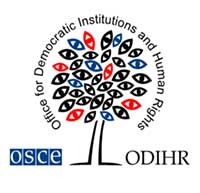The HLC on the disappeared persons in the OSCE meeting
 A side event dedicated to the fight against enforced disappearances in the OSCE region was held on Friday, 25 September 2015, as part of the annual Human Dimension Implementation Meeting of OSCE Participating States. The meeting, under the title of Combatting Enforced Disappearances in the OSCE Region – Progress and Way Forward, was organized by the Ministries of Foreign Affairs of Norway, Switzerland, France and the Netherlands. On behalf of the Humanitarian Law Center, Jelena Krstic presented the efforts to determine the fates of the people who went missing in the context of the armed conflicts in the former Yugoslavia in the Western Balkans region. The meeting was also attended by the Chairman of the UN Committee on Enforced Disappearances (CED), Professor Emmanuel Decaux, a professor at the Faculty of Law at the University of Oslo and former chairman of the UN Working Group on Arbitrary Detention, Mads Andenaes, and Bayram Shikhmuradov from Turkmenistan.
A side event dedicated to the fight against enforced disappearances in the OSCE region was held on Friday, 25 September 2015, as part of the annual Human Dimension Implementation Meeting of OSCE Participating States. The meeting, under the title of Combatting Enforced Disappearances in the OSCE Region – Progress and Way Forward, was organized by the Ministries of Foreign Affairs of Norway, Switzerland, France and the Netherlands. On behalf of the Humanitarian Law Center, Jelena Krstic presented the efforts to determine the fates of the people who went missing in the context of the armed conflicts in the former Yugoslavia in the Western Balkans region. The meeting was also attended by the Chairman of the UN Committee on Enforced Disappearances (CED), Professor Emmanuel Decaux, a professor at the Faculty of Law at the University of Oslo and former chairman of the UN Working Group on Arbitrary Detention, Mads Andenaes, and Bayram Shikhmuradov from Turkmenistan.
Jelena Krstic informed the participants at the meeting that about 11,000 missing persons are still being searched for in the successor states of the former Yugoslavia, adding that for years the main obstacle to determining their fate has been the lack of political will of the national actors. This political indifference prevents the implementation of the mechanisms that are crucial for determining the fate of these missing persons. In fact, in all the post-Yugoslav states, the army and police archives are still not open, or available even to the national institutions for the prosecution of war crimes. Moreover, some senior positions in the civil and security structures are held by individuals who participated in committing and covering up the crimes and who now obstruct any attempts at reform. In addition, a reluctance to indict and prosecute those responsible for the disappearance and concealment of bodies is evident, while victims remain without any form of official support and recognition from the government.
Krstic mentioned Serbia as paradigmatic of this situation, a country which has displayed social and institutional indifference to the fate of the missing persons and an apparent acceptance of complete impunity as regards concealment of their bodies in mass graves in Serbia. The archives of the Serbian army and police are inaccessible to the public and relevant institutions; in some cases they are classified as secret to prevent clarification of the circumstances related to war crimes committed by Serbian forces. Since 2011, the Chief of General Staff of the Serbian Army has been Ljubiša Dikovic, a former Commander of the 37th Motorized Brigade of the Yugoslav Army, whose members committed crimes during the Kosovo war, killing a large number of Albanian civilians. Furthermore, despite the fact that 900 bodies of Kosovo Albanians have been found in mass graves in Serbia and the fact that the entire leadership of Serbia was convicted before the ICTY for the transport of bodies from Kosovo to Serbia, not a single person involved in these crimes has been prosecuted before courts in Serbia. Finally, in accordance with the current legislation, members of families of missing persons cannot be awarded a civilian victim of war status, which would give them certain financial and social benefits, unless they declare their family member deceased. Moreover, even in situations where a missing person has been found, families can exercise these rights only if they fulfill both the requirement of living together in the same household and the requirement of belonging to the immediate family. Not even persons whose family members were killed by Serbian forces can have civilian victim of war status, since the law states that those persons can only be those who were killed by the „enemy“. The victims who cannot acquire these administrative reparations are trying to secure the right to compensation in court proceedings, which are usually very complex and traumatic for them.
Since the Western Balkan states have been ignoring a great number of missing people for a long time, Krstic recommends the application of external pressure and the use of all available mechanisms in order to intensify the search for the missing. She specifically emphasized the importance of a more active engagement on the part of the OSCE and the introduction of the issue of enforced disappearances as one of its commitments, which, once adopted, would become a political point of reference for all members of this international organization.
Professor Emmanuel Decaux and Professor Mads Andenaes talked about the political and legal importance of the International Convention for the Protection of All Persons from Enforced Disappearance. Professor Decaux informed the participants on the ratification of the Convention, the dialogue with the countries that ratified it and the new tools which the CED uses within its efforts to ensure that the provisions of the Convention are obeyed. Professor Andenaes talked about the way in which international law treats enforced disappearances, and the importance of providing reparations to family members of missing persons, as well as taking all available measures to mitigate the consequences of enforced disappearances and compensate for the losses they have produced. Bayram Shikhmuradov from Turkmenistan talked about the efforts to find out the destiny of his father, who was sentenced to life and afterwards disappeared in the notorious system of Turkmen prisons.
The OSCE Human Dimension Implementation Meeting is taking place in Warsaw from 21 September – 2 October 2015.








